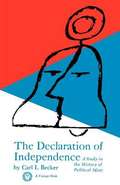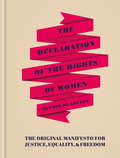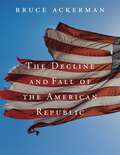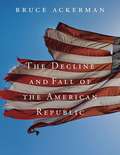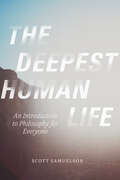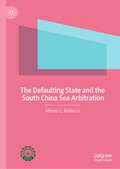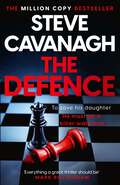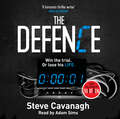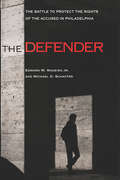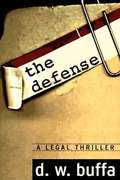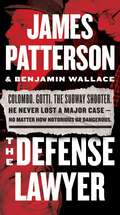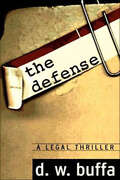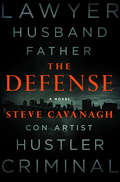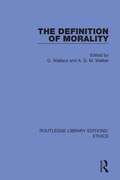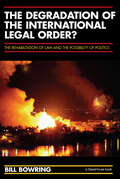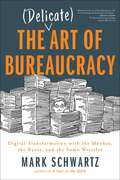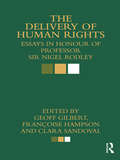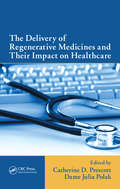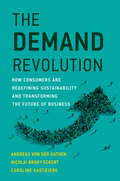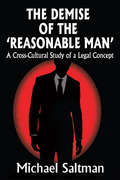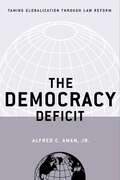- Table View
- List View
The Declaration of Independence: A Study in the History of Political Ideas
by Carl BeckerCarl Becker's important study is an analysis of the concepts expressed in the Declaration of Independence. Here is a lucid explanation of what the Declaration really is, what views it sets forth, where those views arose, and how they have been accepted or modified by succeeding generations. A book that every American should read.
The Declaration of the Rights of Women: The Originial Manifesto for Justice, Equality and Freedom
by Olympe De GougesOlympe de Gouges was the most important fighter for women's rights you've never heard of. An activist and writer in revolutionary Paris, she published 'The Declaration of the Rights of Women' in 1791, and was beheaded two years later, her articulate demands for equality proving too much for their time.<P><P>Over one hundred and fifty years later, the key statements of her declaration were internationally endorsed by the United Nations in its Declaration on the Elimination of Discrimination Against Women, which in turn went on to be legally recognized by nearly every country in the world. <P>This volume presents both of these key texts along with enlightening and inspiring commentary from a host of powerful women, from Virginia Woolf to Hillary Clinton.
The Decline and Fall of the American Republic (Tanner lectures on human values #6)
by Bruce AckermanConstitutional thought is currently dominated by heroic tales of the Founding Fathers — who built an Enlightenment machine that can tick-tock its way into the twenty-first century, with a little fine-tuning by the Supreme Court. However, according to Bruce Ackerman, the modern presidency is far more dangerous today than it was when Arthur Schlesinger published the Imperial Presidency in 1973. In this book, he explores how the interaction of changes in the party system, mass communications, the bureaucracy, and the military have made the modern presidency too powerful and a threat to liberal constitutionalism and democracy. Ackerman argues that the principles of constitutional legitimacy have been undermined by both political and legal factors. On the political level, by “government by emergency” and “government by public-opinion poll”; on the legal, by two rising institutions: The Office of Legal Counsel in the Department of Justice and the Office of the Presidential Counsel in the White House. Both institutions came out of the New Deal, but have gained prominence only in the last generation. Lastly, Ackerman kicks off a reform debate that aims to adapt the Founding ideal of checks-and-balances to twenty-first century realities. His aim is not to propose definitive solutions but to provoke a national debate on American democracy in its time of trouble.
The Decline and Fall of the American Republic (The Tanner Lectures on Human Values, Book #12)
by Bruce AckermanBruce Ackerman shows how the institutional dynamics of the last half-century have transformed the American presidency into a potential platform for political extremism and lawlessness. Watergate, Iran-Contra, and the War on Terror are only symptoms of deeper pathologies. Ackerman points to a series of developments that have previously been treated independently of one another--from the rise of presidential primaries, to the role of pollsters and media gurus, to the centralization of power in White House czars, to the politicization of the military, to the manipulation of constitutional doctrine to justify presidential power-grabs. He shows how these different transformations can interact to generate profound constitutional crises in the twenty-first century--and then proposes a series of reforms that will minimize, if not eliminate, the risks going forward. The book aims to begin a new constitutional debate. Americans should not suppose that Barack Obama's centrism and constitutionalism will typify the presidencies of the twenty-first century. We should seize the present opportunity to confront deeper institutional pathologies before it is too late.
The Decline of Mercy in Public Life
by Alex Tuckness John M. ParrishThe virtue of mercy is widely admired, but is now marginalized in contemporary public life. Yet for centuries it held a secure place in western public discourse without implying a necessary contradiction with justice. Alex Tuckness and John M. Parrish ask how and why this changed. Examining Christian and non-Christian ancient traditions, along with Kantian and utilitarian strains of thought, they offer a persuasive account of how our perception of mercy has been transformed by Enlightenment conceptions of impartiality and equality that place justice and mercy in tension. Understanding the logic of this decline, they argue, will make it possible to promote and defend a more robust role for mercy in public life. Their study ranges from Homer to the late Enlightenment and from ancient tragedies to medieval theologies to contemporary philosophical texts, and will be valuable to readers in political philosophy, political theory, and the philosophy of law.
The Deepest Human Life: An Introduction to Philosophy for Everyone
by Scott SamuelsonThis accessible and thought-provoking introduction to philosophy shows how the eternal questions can shed light on our lives and struggles.These days, we generally leave philosophical matters to professional philosophers. Scott Samuelson thinks this is tragic, for our lives as well as for philosophy. In The Deepest Human Life, he restores philosophy to its proper place at the center of our humanity, rediscovering it as our most profound effort toward understanding, as a way of life that anyone can live. Exploring the works of some of history’s most important thinkers in the context of the everyday struggles of his students, Samuelson guides readers through the most vexing quandaries of existence—and shows just how enriching the examined life can be. Samuelson begins at the beginning: with Socrates, and the method he developed for approaching our greatest mysteries. From there he embarks on a journey through the history of philosophy, demonstrating how it is encoded in our own personal quests for meaning. Through heartbreaking stories, humanizing biographies, accessible theory, and evocative interludes like “On Wine and Bicycles” or “On Zombies and Superheroes,” Samuelson invests philosophy with the personal and vice versa. The result is a book that is at once a primer and a reassurance—that the most important questions endure, coming to life in each of us. Winner of the 2015 Hiett Prize in the Humanities
The Defaulting State and the South China Sea Arbitration
by Alfredo C. Robles Jr.This book focuses on the legal and procedural problems caused by China’s default in the South China Sea Arbitration. Many of these problems arose because in several respects, China departed from the conduct of other defaulting States in cases before the International Court of Justice. The book argues that the Tribunal, confronted with the difficulties of maintaining the balance between two parties in a situation of default, drew on the full range of its powers to ensure that neither China nor the Philippines would suffer from China’s default. Further, the book describes the shortcomings of the submissions of putative amicus curiae. It refutes China’s questioning of the independence and impartiality of the experts and of the judges. In so doing, it explains the expert opinions and the Tribunal ’s assessments of the latter in the areas of satellite imagery, coral reef ecology, and navigational safety, while rebutting the half- truths and counter-truths disseminated by Chinese scholars about the proceedings. The book compares China’s threats to the independence of the Tribunal to its behavior towards Chinese judges. It places China’s accusations of bias against the Tribunal in the context of China’s domestic situation, and concludes that the Tribunal, acting independently and impartially, was able to perform the judicial function, despite China’s default.
The Defence: Win the trial. Or lose his life. (Eddie Flynn Ser.)
by Steve CavanaghEDDIE FLYNN HAS 48 HOURS TO SAVE HIS DAUGHTER...* * * * *'Everything a great thriller should be and I can't wait to see more of Eddie Flynn.' Mark Billingham'So Hollywood, punchy and cool and pacy as hell.' Eva Dolan* * * * *Eddie Flynn used to be a con artist. Then he became a lawyer. Turned out the two weren't that different.It's been over a year since Eddie vowed never to set foot in a courtroom again. But now he doesn't have a choice. Olek Volchek, the infamous head of the Russian mafia in New York, has strapped a bomb to Eddie's back and kidnapped his ten-year-old daughter, Amy. Eddie only has forty-eight hours to defend Volchek in an impossible murder trial - and win - if he wants to save his daughter. Under the scrutiny of the media and the FBI, Eddie must use his razor-sharp wit and every con-artist trick in the book to defend his 'client' and ensure Amy's safety. With the timer on his back ticking away, can Eddie convince the jury of the impossible?**Featuring an extract from Steve Cavanagh's new thriller, The Plea*** * * * *Praise for race-against-time legal thriller writer, Steve Cavanagh:'A gripping, twisty thriller'Ian Rankin, number 1 bestselling author of Rather Be The Devil'Legal thrillers are my blind spot, but I'll always make an exception for Steve Cavanagh. Quite simply, THE PLEA is one of the most purely entertaining books you'll read this year. It's a blast.' John Connolly, bestselling author of the Charlie Parker series'In the crowded field of legal thrillers, Steve Cavanagh stands head and shoulders above the competition, with his skilfully plotted, action-packed and big-hearted Eddie Flynn novels . . . highly intelligent, twist-laden and absolutely unputdownable'Eva Dolan, author of the critically acclaimed Tell No Tales'A cleverly constructed legal thriller combined with a classic locked-room mystery. Eddie Flynn is fast becoming one of my favourite fictional heroes and Cavanagh one of my favourite thriller writers.' S.J.I. Holliday, author of Black Wood'Raymond Chandler could have created Eddie Flynn. THE PLEA is Phillip Marlowe and Michael Connolly's Mickey Haller combined, with a bit of Jim Thompson's THE GRIFTERS thrown in. A superb read with a main character destined to be one of the most talked about in crime fiction.' Howard Linskey, author of The Search* * * * *If you like John Grisham, Lee Child and Michael Connelly, you will LOVE the gripping and twisty Eddie Flynn series:1. The Defence2. The Plea3. The Liar4. Thirteen* Each Eddie Flynn thriller can be read as a standalone or in series order *
The Defence: Win the trial. Or lose his life. (Eddie Flynn Series)
by Steve CavanaghEDDIE FLYNN HAS 48 HOURS TO SAVE HIS DAUGHTER...* * * * *'Everything a great thriller should be and I can't wait to see more of Eddie Flynn.' Mark Billingham'So Hollywood, punchy and cool and pacy as hell.' Eva Dolan * * * * *Eddie Flynn used to be a con artist. Then he became a lawyer. Turned out the two weren't that different.It's been over a year since Eddie vowed never to set foot in a courtroom again. But now he doesn't have a choice. Olek Volchek, the infamous head of the Russian mafia in New York, has strapped a bomb to Eddie's back and kidnapped his ten-year-old daughter, Amy. Eddie only has forty-eight hours to defend Volchek in an impossible murder trial - and win - if he wants to save his daughter. Under the scrutiny of the media and the FBI, Eddie must use his razor-sharp wit and every con-artist trick in the book to defend his 'client' and ensure Amy's safety. With the timer on his back ticking away, can Eddie convince the jury of the impossible?**Featuring an extract from Steve Cavanagh's new thriller, The Plea*** * * * *Praise for race-against-time legal thriller writer, Steve Cavanagh:'A gripping, twisty thriller' Ian Rankin, number 1 bestselling author of Rather Be The Devil'Legal thrillers are my blind spot, but I'll always make an exception for Steve Cavanagh. Quite simply, THE PLEA is one of the most purely entertaining books you'll read this year. It's a blast.' John Connolly, bestselling author of the Charlie Parker series'In the crowded field of legal thrillers, Steve Cavanagh stands head and shoulders above the competition, with his skilfully plotted, action-packed and big-hearted Eddie Flynn novels . . . highly intelligent, twist-laden and absolutely unputdownable' Eva Dolan, author of the critically acclaimed Tell No Tales'A cleverly constructed legal thriller combined with a classic locked-room mystery. Eddie Flynn is fast becoming one of my favourite fictional heroes and Cavanagh one of my favourite thriller writers.' S.J.I. Holliday, author of Black Wood'Raymond Chandler could have created Eddie Flynn. THE PLEA is Phillip Marlowe and Michael Connolly's Mickey Haller combined, with a bit of Jim Thompson's THE GRIFTERS thrown in. A superb read with a main character destined to be one of the most talked about in crime fiction.' Howard Linskey, author of The Search* * * * *If you like John Grisham, Lee Child and Michael Connelly, you will LOVE the gripping and twisty Eddie Flynn series:1. The Defence2. The Plea3. The Liar4. Thirteen* Each Eddie Flynn thriller can be read as a standalone or in series order *
The Defence: Win the trial. Or lose his life. (Eddie Flynn Series)
by Steve CavanaghThe truth has no place in a courtroom. The truth doesn't matter in a trial.The only thing that matters is what the prosecution can prove.Eddie Flynn used to be a con artist. Then he became a lawyer. Turned out the two weren't that different.It's been over a year since Eddie vowed never to set foot in a courtroom again. But now he doesn't have a choice. Olek Volchek, the infamous head of the Russian mafia in New York, has strapped a bomb to Eddie's back and kidnapped his ten-year-old daughter Amy. Eddie only has 48 hours to defend Volchek in an impossible murder trial - and win - if wants to save his daughter. Under the scrutiny of the media and the FBI, Eddie must use his razor-sharp wit and every con-artist trick in the book to defend his 'client' and ensure Amy's safety. With the timer on his back ticking away, can Eddie convince the jury of the impossible?Lose this case and he loses everything.(p) 2015 Orion Publishing Group
The Defender: The Battle to Protect the Rights of the Accused in Philadelphia
by Edward W. Madeira Jr. Michael D. SchafferLong before the Supreme Court ruled that impoverished defendants in criminal cases have a right to free counsel, Philadelphia’s public defenders were working to ensure fair trials for all. In 1934, when penniless defendants were routinely railroaded through the courts without ever seeing a lawyer, Philadelphia attorney Francis Fisher Kane helped create the Voluntary Defender Association, supported by charity and free from political interference, to represent poor people accused of crime. When the Supreme Court’s 1963 decision Gideonv. Wainwright mandated free counsel for indigent defendants, the Defender (as it is now known) became more essential than ever, representing at least 70 percent of those caught in the machinery of justice in the city. Its groundbreaking work in juvenile advocacy, homicide representation, death-row habeas corpus petitions, parole issues, and alternative sentencing has earned a national reputation. In The Defender, Edward Madeira, past president of the Defender’s Board of Directors, and former Philadelphia Inquirer journalist Michael Schaffer chart the 80-plus-year history of the organization as it grew from two lawyers in 1934 to a staff of nearly 500 in 2015. This is a compelling story about securing justice for those who need it most.
The Defense (Joseph Antonelli Book #1)
by D. W. BuffaIt was a one-way ticket out of his self-imposed isolation and into the courtroom on the right side of justice. It was a favor for his old friend Judge Horace Woolner. It was a once-in-a-lifetime chance to serve as special prosecutor in a case against a man sworn to uphold the law, Marshall Goodwin, the chief deputy district attorney accused of having his former wife murdered. It was an opportunity Joseph Antonelli couldn't walk away from. But Antonelli is walking into more than he bargained for. The Goodwin case renews his appetite for the practice of law, and although Antonelli is determined to remain on the side of justice, there are many shades between right and wrong. And Antonelli may be over his head when Russell Gray, an urbane, worldly, and wealthy man from a prominent Portland family, is found murdered in his living room. Horace Woolner's wife stands accused of the crime. With justice and love on the line, the stakes couldn't be higher. In this stunning look at our legal system and our hearts, D. W. Buffa delivers on the promise of The Defense and takes us into the dark recesses of our courtrooms and our souls, where there are no easy answers.
The Defense Lawyer: The Barry Slotnick Story
by James Patterson Benjamin WallaceFor more than a decade, Barry Slotnick never lost a case—no matter how notorious or dangerous his clients. Everyone deserves the best defense. Known for his sharp mind, sharp suits, and bold courtroom strategies, Bronx-native Barry Slotnick is known as the best criminal lawyer in the US. He calls himself &“Liberty&’s Last Champion.&” Slotnick mediates Bette Midler&’s bathhouse contract and represents John Gotti, &“The Dapper Don.&” He defends &“Subway Shooter&” Bernie Goetz and negotiates future First Lady Melania Trump&’s pre-nup. His unparalleled legal brilliance defines a profession, a city—and an era.
The Defense: A Legal Thriller
by D. W. BuffaDynamite defense attorney Joseph Antonelli has never lost a case--or felt the sting of conscience for letting the guilty go free. "I can deceive anyone," he says, "and no one more quickly or more completely than myself." Now the man he most admires, the honorable Judge Rifkin, has asked him a favor: Defend a drug dealer accused of raping his twelve-year-old stepdaughter. Yet in D. W. Buffa's The Defense, Antonelli's acceptance of the case sets in motion an explosive chain of corruption, betrayal, and murder that will leave no one unscathed. . . .
The Defense: A Novel (Eddie Flynn #1)
by Steve Cavanagh"If you're a fan of John Grisham, Scott Turow, and Brad Meltzer, then you will be a fan of Steve Cavanagh's The Defense." --Nelson DeMille, #1 New York Times bestselling author of Radiant AngelEddie Flynn used to be a con artist. Then he became a lawyer. Turns out the two aren't that different.Former con artist turned lawyer Eddie Flynn gave up the law a year ago after a disastrous case, and he vowed never to step foot in a courtroom again. But now he doesn't have a choice. The head of the Russian mob in New York City, on trial for murder, has kidnapped Eddie's ten-year-old daughter: Eddie has to take this case whether he likes it or not.Using his razor-sharp wit and every con, bluff, grift, and trick in the book, Eddie has only forty-eight hours to defend an impossible murder trial. And if he loses this case, he loses everything.
The Definition of Morality
by G. Wallace A. D. M. WalkerOriginally published in 1970, the papers in this volume discuss the essential and defining characteristics of morality and moral issues and examine how moral views differ from political views, moral beliefs from religious beliefs, and moral judgements from aesthetic judgements. Some of the chapters discuss problems of method and shed light on the complex conditions which any successful definition of morality must satisfy. Taken collectively, these papers reflect he wide variety of approaches adopted by contemporary philosophers.
The Degradation of Ethics Through the Holocaust
by Paul E. WilsonThis book discusses ethical behavior through the genocidal stages of the Holocaust. Paul E. Wilson first looks at the antisemitism in Germany and Europe beginning in the decades preceding the Nazis reign of terror, and goes on to discuss the ethical decisions made in the initial stages that moved society toward genocide. The author maintains that the stages of genocide represent subtle changes that can be happening within a society in response to the moral choices made by actors. By giving attention to the stages of genocide in the Holocaust, this book contributes to the overall understanding of how the Holocaust was possible, and encourages the moral community to join the watch for the development of genocide in the modern world.
The Degradation of the International Legal Order?: The Rehabilitation of Law and the Possibility of Politics
by Bill BowringProviding the basis for critical engagement with the pessimism of the contemporary age, The Degradation of the International Legal Order? argues passionately for a rehabilitation of the honour of historic events and processes, and of their role in generating legal concepts. Drawing primarily from the Marxian tradition, but also engaging with a range of contemporary work in critical theory and critical legal and human rights scholarship, this book analyses historical and recent international events and processes in order to challenge their orthodox interpretation. What is thus proposed is a new evaluation of international legal principles and human rights norms, the revolutionary content of which, it is argued, turns them from mere rhetoric into powerful weapons of struggle. Accessibly written, but theoretically sophisticated, this original and timely book is intended for critical teachers and students of international law, human rights, and international relations, as well as legal and political activists.
The Delicate Art of Bureaucracy: Digital Transformation with the Monkey, the Razor, and the Sumo Wrestler
by Mark Schwartz Mark SchwartzMark Schwartz, author of leadership classics A Seat at the Table and The Art of Business Value, reveals a new (empowering) model for the often soul-shattering, frustrating, Kafkaesque nightmare we call bureaucracy. Through humor, a healthy dose of history and philosophy, and real-life examples from his days as a government bureaucrat, Schwartz shows IT leaders (and the whole of business) how to master the ways of the Monkey, the Razor, and the Sumo Wrestler to create a lean, learning, and enabling bureaucracy. For anyone frustrated by roadblocks, irritated the business can't move fast enough, or suffering under the weight of crushing procedures, this book is for you. No matter your role, you need a playbook for bureaucracy. This is it. With this playbook, you can wield bureaucracy as a superpower and bust through it at the same time
The Delimitation of the Continental Shelf between Denmark, Germany and the Netherlands
by Alex G. Oude ElferinkAlex G. Oude Elferink's detailed analysis of the negotiations between Denmark, Germany and The Netherlands concerning the delimitation of their continental shelf in the North Sea makes use of the full range of government archives in these three States. He looks at the role of international law in policy formulation and negotiations, and explores the legal context, political considerations and, in particular, oil interests which fed into these processes. He also explains why the parties decided to submit their disputes to the International Court of Justice and looks at the preparation of their pleadings and litigation strategy before the Court. The analysis shows how Denmark and The Netherlands were able to avoid the full impact of the implications of the Court's judgment by sidestepping legal arguments and insisting instead on political considerations.
The Delivery of Human Rights: Essays in Honour of Professor Sir Nigel Rodley
by Geoff GilbertThe Delivery of Human Rights reflects on two overlapping issues in international human rights law: how can existing norms be better implemented and effected, and how can other branches of international law or other international actors be used so as to provide an improved delivery of those norms. Rather than simply looking at the content of the rights, this book will also explore how the framers’ intention that individuals benefit from the norms can be achieved. The book is written and published in honour of Professor Sir Nigel Rodley KBE. It celebrates his career as an academic and practitioner in the area of human rights. Professor Rodley acted as the UN Special Rapporteur on Torture from 1993 to 2001 and is currently a member of the UN Human Rights Committee. He is also a member of the International Commission of Jurists. Since 2001 he has been a Member of the UN Human Rights Committee, established under the International Covenant on Civil and Political Rights. In 1998 he was knighted in the Queen's New Year's Honours list for services to Human Rights and International Law and in 2000 he received an honorary LLD from Dalhousie University. He is Professor and Chair of the Human Rights Centre, University of Essex, having taught there since 1990. The contributors to this volume are notable experts in the area of human rights law and include Paul Hunt, Malcolm Evans, Michael O’Flaherty and David Weissbrodt. The book addresses such topics as the Role of Special Rapporteurs, how can the absolute prohibition of torture be properly implemented, Responsibility to Protect, non-state actors, including businesses, and human rights.
The Delivery of Regenerative Medicines and Their Impact on Healthcare
by Dame Julia Polak Catherine D. PrescottNow that prohibitions against stem cell research are relaxing, it is time for the field to move forward with the advances that promise to eliminate so much human suffering. However, it would be naive to ignore the fact that regenerative medicines pose a whole new set of challenges to an industry sector that for decades has geared itself to the deve
The Demand Revolution: How Consumers Are Redefining Sustainability and Transforming the Future of Business (Management on the Cutting Edge)
by Andreas von der Gathen Nicolai Broby Eckert Caroline KastbjergHow consumer desire for sustainability is powering the first demand-driven, transformative megatrend—and how business leaders can make the most of this important moment.Sustainability is rocking the business world as profoundly as any global trend of the past, from electrification to digitalization. But unlike previous revolutions, this one is being driven by consumers, for whom environmentally sound practices matter as much as price, quality, and brand. In The Demand Revolution, Andreas von der Gathen, Nicolai Broby Eckert, and Caroline Kastbjerg offer a strategic framework for winning these consumers—and taking advantage of the vast commercial opportunity presented by sustainability as the first demand-driven, transformative megatrend.The first movers in the Demand Revolution will be able to create enduring competitive advantages and high entry barriers built around redesigned business model ecosystems and customer loyalty, the authors explain, but this will require a critical adjustment in thinking and approach. Companies, first of all, have to catch up with consumers, who see themselves on a demand curve far beyond what companies currently perceive. Business leaders must shift their focus from the cost of sustainability to its potential for generating growth and long-term profits. This, in turn, means recognizing that the classic adoption curves for innovations—and the strategic playbooks derived from those insights—no longer apply. The Demand Revolution shows business leaders how to look beyond easy fixes and incremental outcomes and instead pursue high-risk, high-reward moves geared toward the source of exponential growth: the world&’s consumers.
The Demise of the Reasonable Man: A Cross-cultural Study of a Legal Concept
by Michael SaltmanJudges in most societies often resort to resolving disputes by means of applying a criterion of reasonableness. In The Demise of the'Reasonable Man' Michael Saltman explores the ways in which reasonableness varies from one legal culture to another, defined by the relative presence or absence of centralized political power. In non-politically centralized societies, Saltman says, judges seek meanings underlying human behavior, and try to place reasonableness within a societal and cultural context. This is possible because primitive societies are relatively homogenous in their values and tend towards consensus when determining what constitutes reasonable behavior. In contrast, modern judges resort to standards of reasonableness only when the legal standard is unclear. Saltman contrasts judges in politically centralized societies, who, in the absence of such consensus, have the authority to determine, on the basis of that authority, what constitutes reasonableness. This rich volume references case studies drawn from ethnographic fieldwork, historical sources, and law reports to demonstrate differences in judicial attitudes toward reasonableness.
The Democracy Deficit: Taming Globalization Through Law Reform
by Alfred C. Aman Jr.Economic globalization has had a chilling effect on democracy since markets now do some of the work that governments used to do through the political process. More than two decades of deregulation have made a healthy economy appear to depend on unrestrained markets. But appearances are misleading—globalization is also a legal and political process. The future of democracy in the twenty-first century depends on the ability of citizens to reclaim a voice in taming globalization through domestic politics and law reform. "The book's topic could not be more important: how do we adapt contemporary democratic governance- and contemporary administrative law- to the challenge of a globalizing world?"—Kal Raustiala, UCLA School of Law Can citizens govern globalization? Aman argues that they can, and that domestic law has a crucial role to play in this process. He proposes to redefine the legal distinction between public and private to correspond to the realities of the new role of the private sector in delivering public services, and thereby to bring crucial sectors of globalization back within the scope of democratic reform. Basing his argument on the history of the policies that led to globalization, and the current policies that sustain it, Aman advocates specific reforms meant to increase private citizens' influence on globalization. He looks at particular problem areas usually thought to be domestic in nature, such as privatization, prisons, prescription drugs, and the minimum wage, as well as constitutional structural issues such as federalism and separation of powers.
